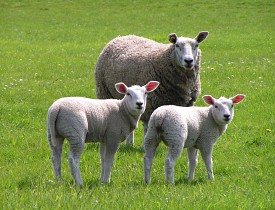Getting a Better Night's Sleep
 We all know nothing compares to a good night's sleep -- you wake up feeling refreshed and ready to take on the day. In fact, repairs to blood cells, tissues, and the brain occur during sleep; that's why the third of our lives we spend sleeping is essential for proper functioning and health, according to sleep expert Chris Idzikowski in his book Learn to Sleep Well. And yet, between five and ten percent of Americans are affected by insomnia.
We all know nothing compares to a good night's sleep -- you wake up feeling refreshed and ready to take on the day. In fact, repairs to blood cells, tissues, and the brain occur during sleep; that's why the third of our lives we spend sleeping is essential for proper functioning and health, according to sleep expert Chris Idzikowski in his book Learn to Sleep Well. And yet, between five and ten percent of Americans are affected by insomnia.
Insomnia is defined by the Mayo Clinic as difficulty to fall asleep or difficulty to stay asleep, issues which can eventually be detrimental to your quality of life. Before you turn to pharmaceuticals, there are simple steps you can take to help yourself get a better night's sleep.
Tryptophan and Sandman are Friends
According to the book The Everything Guide to Food Remedies by Lori Rice, foods that contain the amino acid tryptophan help promote sleep. Many protein-rich foods are good sources of tryptophan. Rice suggests "shrimps, scallops, cod, chicken, and turkey" as a light snack close to bedtime to help induce sleep. According to WebMD.com, other good sources are milk, nuts, seeds, bananas, and eggs. Carbohydrate-rich foods complement these foods because they facilitate tryptophan absorption in the blood.
Other Useful Foods
Various other foods are recommended in both The Everything Guide and Learn to Sleep Well. For instance, lettuce, honey and B-vitamins each enhance relaxation and help induce sleep. Foods rich in the mineral magnesium like green vegetables, avocados, bananas and peanut butter help improve the quality of sleep.
You should also be aware of the foods that prevent good sleep. "If we eat unhealthily, we can suffer from heartburn, indigestion and numerous other food-related disorders, which can affect our sleep adversely," Idzikowski warns. "Eating to improve sleep is about ensuring that we eat healthily in general, not just to enhance the part of our lives that we spend sleeping." He suggests eating organic certified foods and avoiding ingredients like monosodium glutamate (MSG) and the yellow food coloring tartrazine (E-102) which can adversely affect sleep.
Snacks Are Good, But Not Too Much
According to the Mayo Clinic, while tryptophan-rich snacks can help with sleep, a large meal at night (within three hours of going to bed) will exacerbate insomnia. On the other hand, going to bed feeling hungry can be just as bad.
Avoid Alcohol, Caffeine and Nicotine
Alcohol, caffeine, and nicotine all affect sleep and are referred to as "sleep thieves" in Learning to Sleep Well. Caffeine should be avoided at least six hours before bedtime, but ideally ten hours before. While a small amount of alcohol can induce drowsiness, larger amounts can interfere with restful sleep, leading you to wake up randomly in the night. Nicotine can have a similar effect on sleep.
The Sleep Environment
Although it may be obvious, the sleep environment is worth mentioning (this is, after all, a home & garden article). The temperature of your bedroom, the noise level and even the quality of your mattress can all affect your ability to sleep well. Idzikowski mentions that research has shown that an ideal sleep temperature is around 62ºF; noise machines can create a white noise or ocean sounds which are conducive to sleep; and the average mattress is 75% deteriorated after 10 years of use, and should be replaced at that point.
Jordan Laio is a Hometalk - http://www.hometalk.com - writer. Get home & garden ideas like this - https://www.networx.com/article/getting-a-better-nights-sleep - on Hometalk.
Looking for a Pro? Call us (866) 441-6648

Remodeling Average Costs
Remodeling Contractors Experiences

Repairing Our Roof Valley Stopped A Leak From Getting Worse

Tile Backsplash Installation Turned Out Perfect



